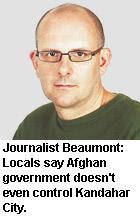Our warm welcome turns to hostility
Some observations and commentary:
Nato's lost causePursuant to Ali's claim that Taliban fighters control 20 southern districts comes this bit from Afghan news agency Quqnoos:
Tariq Ali
... US failure in Afghanistan is now evident and Nato desperation only too visible. Spreading the war to Pakistan would be a disaster for all sides. The Bush-Cheney erais drawing to a close, but it is unlikely that their replacements, despite the debacle in Iraq, will settle the American giant back to a digestive sleep...
That the "good war" has now turned bad is no longer disputed by a number of serious analysts in the US, even though there is no agreed prescription for dealing with the problems. Not least of which for some is the future of Nato, stranded far away from the Atlantic in a mountainous country, the majority of whose people, after offering a small window of opportunity to the occupiers, realised it was a mistake and became increasingly hostile.
The "neo-Taliban" control at least 20 districts in the Kandahar, Helmand and Uruzgan provinces where Nato troops replaced US soldiers. It is hardly a secret that many officials in these zones are closet supporters of the guerrilla fighters. As western intelligence agencies active in the country are fully aware, the situation is out of control...
... repression, striking blindly, leaves people with no option but to back those trying to resist, especially in a part of the world where the culture of revenge is strong. When a whole community feels threatened it reinforces solidarity, regardless of the character or weakness of those who fight back.
Many Afghans who detest the Taliban are so angered by the failures of Nato and the behaviour of its troops that they are hostile to the occupation...
The basing agreement signed by Washington with its appointee in Kabul in May 2005 gives the Pentagon the right to maintain a massive military presence in Afghanistan in perpetuity...
There are at least two routes out of the Khyber impasse. The first and the worst would be to Balkanise the country...
The second alternative would require a withdrawal of all US/Nato forces, either preceded or followed by a regional pact to guarantee Afghan stability for the next ten years...
Nato's failure cannot be simply blamed on the Pakistani government. It is a traditional colonial ploy to blame "outsiders" for internal problems...
The solution is political, not military. And it should be sought in the region not in Washington or Brussels. (link)
Taliban run four districts in Helmand - officialThe Toronto Star's Rosie DiManno's recent dispatch from Afghanistan echoes Ali's comments. As the dust settles following her encounter with arrogant U.S. soldiers, she relates one local's reaction:
Governor says military efforts are under way to retake districts
June 16 - The Taliban have occupied four districts in the province of Helmand, according to the provincial governor Gulab Mangal.
The governor said the army were currently trying to re-take the districts of Marjar, Baghran, Washer and Naw Zad... (link)
"This is why Afghans have come to hate Americans," said my driver, who works as an interpreter for ISAF and is a strong advocate of the NATO mission in Afghanistan.The Observer's Peter Beaumont covers some of the same ground:
"Afghanistan is not our country any more. They are our bosses. They treat us sometimes as if we are trespassing on our own land." ...
But I suspect some more enemies were made on this afternoon, adding incrementally to the hostility that is rapidly replacing the warm welcome that most Afghans had originally given their "liberators." ... (link)
Fear, disillusion and despair: notes from a divided land as peace slips away
Peter Beaumont
The Observer, June 8
... As even some Western diplomats are beginning to acknowledge, the prevailing fear is that the war is in danger not of being lost or won in Helmand province, but in the perceptions of Afghans...
What optimism that there was after the fall of the Taliban has largely dissipated...
When asked, the unemployed who gather at the roundabouts, the tribal leaders, and the women activists, the journalists and the housewives list the same complaints. Karzai, they say, is 'weak'. Security is disintegrating. His cabinet is corrupt, the country is in danger again of descending into warlordism...
Other Western officials concede one of the country's most pressing problems is that Afghans are no longer being persuaded that the course set out in the Bonn Conference and the Afghanistan Compact of 2006 has any meaning for them...
[A Kabul man asks:] 'There are soldiers of 40 countries fighting here. So why is the fighting still going on? We have peacekeepers not keeping the peace. The countries who send them [are] not co-operating but following their own agendas, and a weak government [has] no control. If this situation continues for another month, people will start leaving Afghanistan again.' ...
But Kandahar's differences exist in a hidden geography, in such places as Loyah Wallah, the 'Big Canal' district, towards the city university where the Taliban discreetly hold sway. Officially the government says it controls the city. But local people tell a different story...
In the town of Lashkar Gah, Haji Omar Qani, the local head of Rural Rehabilitation and Development, describes his country's decline. 'Three years ago,' he says, 'we used to work all over Helmand province.' But that was before the renewed Taliban insurgency that gained pace in 2006.
'In the last two years we have been able to work in six of the 13 districts.' An experimental farm is being run by the government with US and British aid on the outskirts of Lashkar Gah. Despite claims the town is 'pacified', the farm has watchtowers and guards with guns. 'The farm can be insecure,' Qani explains... (link)



No comments:
Post a Comment